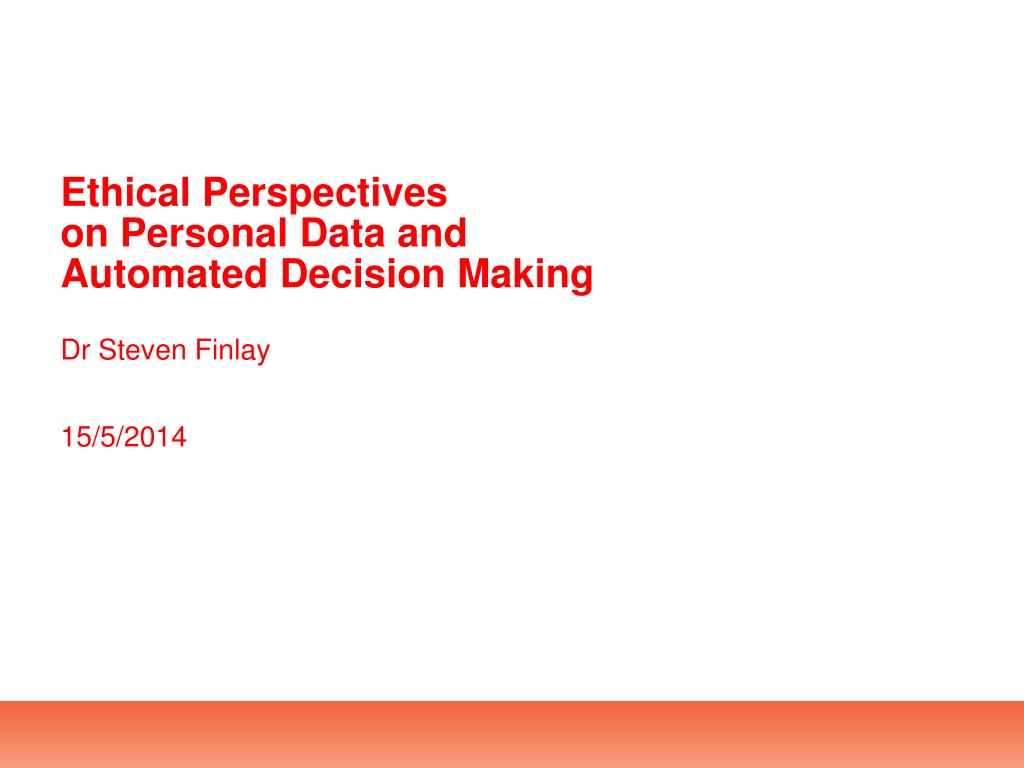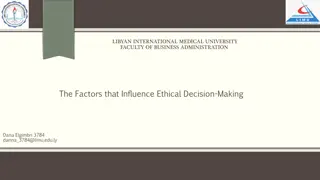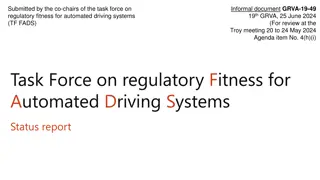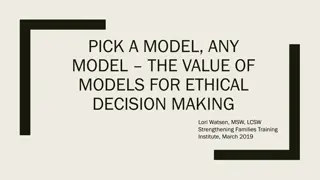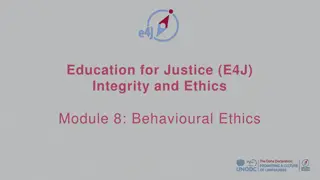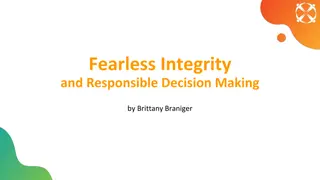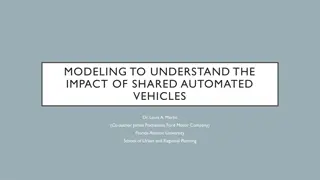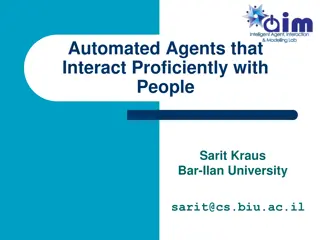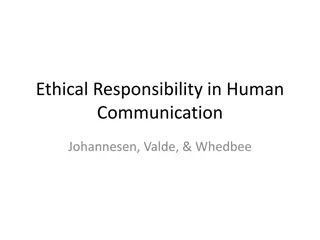Exploring Ethical Perspectives on Personal Data and Automated Decision Making
Delve into the realms of ethics, data, and decision-making with insights from Dr. Steven Finlay. This presentation covers the essence of ethics, common ethical frameworks, ethical practice challenges, and the real-world relevance of ethical considerations in personal and organizational contexts.
Uploaded on Sep 30, 2024 | 0 Views
Download Presentation

Please find below an Image/Link to download the presentation.
The content on the website is provided AS IS for your information and personal use only. It may not be sold, licensed, or shared on other websites without obtaining consent from the author. Download presentation by click this link. If you encounter any issues during the download, it is possible that the publisher has removed the file from their server.
E N D
Presentation Transcript
Ethical Perspectives on Personal Data and Automated Decision Making Dr Steven Finlay 15/5/2014
Agenda 1. A bit about ethics 2. Ethics, data and decision making 2
A bit about ethics. Definitions 1. Ethics, sometimes known as philosophical ethics, ethical theory, moral theory, and moral philosophy, is a branch of philosophy that involves systematizing, defending and recommending concepts of right and wrong conduct, often addressing disputes of moral diversity. The term comes from the Greek word ethikos from ethos, which means "custom, habit". The superfield within philosophy known as axiology includes both ethics and aesthetics and is unified by each sub-branch's concern with value http://en.wikipedia.org/wiki/Ethics 2. Its about right and wrong. Ethics is . Subjective, personal, unique 3
Common ethical frameworks Ethics Non-Consequentialist It s more about the journey than where you end up Consequentialist The means justify the ends Religious Teaching (e.g. the ten commandments) Kant s ethical theory Universality: Ethical is something all rational people would agree with Virtues Virtuous modes of behaviour (Aristotle) Utilitarianism Greatest good for the greatest number (Jeremy Bentham and John Stuart Mills) Golden rule Do unto others as you would have done unto you (Do no evil) (Human) rights Right to life, liberty, property, privacy, etc. (Locke and Rawls) 4
Ethics in practice All ethical frameworks have their weaknesses 5
A bit about ethics. Relevance in the real world If I follow all laws and regulations, then that s all I need to worry about right? Legal Lots of laws allow unethical actions to occur: Ethical It is illegal to give alcohol to a child under 5 Another example is tax avoidance: A great example of what we mean when we talk about the spirit of the law as opposed to the letter of the law 6
A bit about ethics. Relevance in the real world It pays to be ethically minded: Organizations adopting ethical policies tend to reap the benefits. Largest ever study of the relationship between ethical performance and financial performance: Losses from reputational damage, resulting from actions that are perceived to be unethical, are particularly severe. Corporate virtue in the form of social and, to a lesser extent, environmental responsibility is rewarding in more ways than one. (Orlitzky et al. 2003) 7
A bit about ethics. Summary There are many ethical perspectives. We all have our own view on the rightness/wrongness of different actions. Ethical theory is all very well, but putting it into practice is difficult. The world is a messy mixed up place. The one thing that can be said to apply across all ethical frameworks: An ethical action is one which the perpetrator can defined in terms of more than self interest. (Finlay 2000). Ethics pays. A well thought out, well implemented ethical corporate policy benefits both organizations and consumers/individuals in the long run. 8
Agenda 1. A bit about ethics 2. Ethics, data and decision making 9
Ethics, data and decision making. Whose data is it anyway? Kantian/Rights based perspective Utilitarian orientated perspective My data is a resource to be harvested and put to use. My data is a part of who and what I am. Its mine! Constraints (laws) to prevent specific abuses and misuse of my data. My data should be treated with respect, just as I expect to be treated with respect. I will decide how data about me is used. You have no right to use my data without my permission. Better data & predictions = better outcomes. Everyone benefits. 10
Ethics, data and decision making. Whose data is it anyway? Approach Pros Cons More/better data means better decision making. More get the very best deals (if they warrant it). Social benefits. More data to support national / community initiatives (e.g. medical research and counterterrorism). Best for the economy. Each individual has control over their data and the uses to which it is put. Less social exclusion.. Right change/withdraw permission to use data, including Right to be forgotten. People less in control of their own destinies. Better predictions does not always equate to increased in well-being. The have-nots have even less. Once the data is out there, its out there for good. Utilitarian orientated perspective Poorer decisions for individuals may result, if data is withheld or otherwise unavailable. Lower economic benefits. Society as a whole may suffer because large scale studies are data limited. (e.g. medical research and counter terrorism). Kantian/Rights based perspective 11
Ethics, data and decision making. Is more data and better prediction always better? More/better data leads to the promise of near perfect predictions in some areas. Is this a good thing? Sometimes: Identify terrorist subjects with high degree of certainty Predict that a heart attack is very likely in the next 24 hours Long term compatibility on a dating site .. But not always Near perfect insurance claim predictions are no benefit to anyone (except the insurer) Do I want to know, years in advance, when I am likely to die? .. 12
Ethics, data and decision making. Whose data is it anyway? What s the direction of Travel? EU has taken a rights based approach, and looks like it will continue to do so, via revised Data Protection Legislation approved in March. USA, has to date, followed a more utility based model. Use data for whatever you want, but we will legislate where needed. 13
Ethics, data and decision making. What data to use when? Age Alcohol consumption Credit history Criminal records Dependents DNA Driving speed Education Gas consumption Gender Grocery purchases at supermarket Income Last book purchased Live with smoker (Y/N) Marital status Medical history Music currently listening too Race Religion Sexual orientation Smoker (Y/N) Type of car you drive 14
Ethics, data and decision making. 1. Immutability of data? Mutable Immutable (Individual can t change at all) (Individual can change easily) DNA Income Criminal record Alcohol consumption Last book purchased Age Education Gender Type of car Dependents Race Smoker Music currently Listening too Religion Live with smoker Gas Sexual orientation Grocery purchases consumption Medical history Driving speed Marital status 15
Ethics, data and decision making. 2. Beneficiary? For whose benefit is a decisions made ? (This is not the same thing as if the individual benefits from the decision) Decision maker Individual / society Match on dating site Parole Benefit payment Foreclosure Survey selection Product marketing Redundancy selection Treatment for illness Credit granting Selection for tax inspection Home Making job offers improvement grants Suspect selection in criminal cases Insurance pricing Child protection 16
Ethics, data and decision making: 3. Impact What is the potential impact of decisions on an individual s well being? Low Impact High Impact Match on dating site Foreclosure Home Benefit payment improvement grants Parole Credit granting Making job offers Survey selection Child protection Insurance pricing Redundancy selection Product marketing Treatment for illness Selection for tax inspection Suspect selection in criminal cases 17 17
Ethics, data and decision making. Risk in decision making Decision maker High 3. Impact on individual 2. Beneficiary of decision Low Individual Mutable 1. Immutability of data Immutable 18
You need to decide whats most important within your ethical view (i.e. column order). E.G, foreclosure, redundancy, parole More legislation Audit & regulatory oversight Public interest Greater manual involvement Simple and explicable models Judgemental overriding Expert Buy-in Understand model weaknesses Constant monitoring Impact of decision on individual Beneficiary of the decision Immutability of data used Ethical challenge / risk High Decision maker High Low High Low High Low High Low Greatest Individual Low Decision maker Less legislation Predictive ability trumps all else Complex black box models Automated model generation Rapid redevelopment of models Little oversight Individual Least E.G. Marketing type applications
Ethics, data and decision making: Alternative perspective Its nothing to do with the data or the decision maker Its how you make the decision that s important Impartial, data driven process = GOOD (Ethical) Biased/judgemental decision = BAD (Unethical) Example: If women more likely to do X or Y than men (or vice versa), then its fine for Gender to feature in a predictive model, if that s what the data is telling us. However, this view is not popular, at least not in the UK or EU. As evidenced by (fairly) recent decisions on the use of Gender in insurance, despite gender being one of the most predictive data items for all sorts of insurance claim behaviour. 20
In Summary Ethical data use and decision making brings its own rewards An ethical strategy is about more than just following the law. Ethical and legal is where you want to be Some things to consider when formulating an ethical data and decision making policy: The immutability of the data that you use. The impact that your decisions will have on individuals. The beneficiaries of the decisions you make. 21
Bibliography and further reading Boatright, J. (2014) Ethics in Finance (3rd Edition). Wiley Finlay, P. (2000). An introduction to Business and Corporate Strategy. Pearson Education. Finlay, S. (2014). Predictive Analytics, Data Mining and Big Data. Myths, Misconceptions and methods. Palgrave Macmillan. Orlitzky, M., Schmidt, F. L., Rynes, S. L. (2003). Corporate Social and Financial Performance: A Meta-analysis. Organization Studies, volume 24, number 3, pages 403-441. 22
